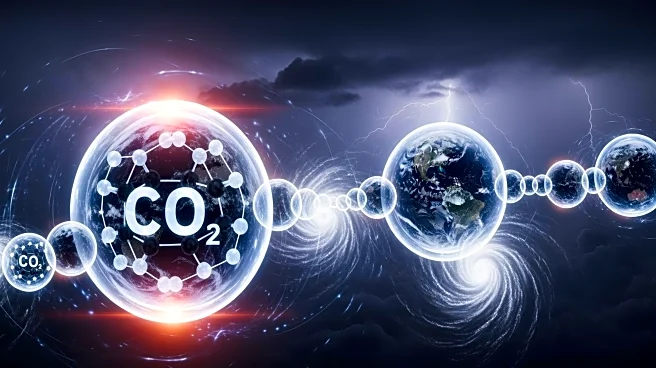What's Happening?
The World Meteorological Organization (WMO) has reported that carbon dioxide levels in the atmosphere have reached unprecedented highs, potentially exacerbating global warming and leading to more extreme
climate events. The report highlights a significant increase in CO2 concentration from 2023 to 2024, marking the largest rise since modern measurements began in 1957. This surge is attributed to the burning of fossil fuels and increased wildfires, particularly in South America. The report was released ahead of the United Nations Climate Change Conference in Brazil, emphasizing the urgent need for emission reductions. Other greenhouse gases, such as methane and nitrous oxide, have also reached record levels, further contributing to climate change.
Why It's Important?
The rise in CO2 levels is a critical concern for global climate stability, as it intensifies the greenhouse effect, leading to more severe weather patterns. This development poses significant risks to ecosystems, economies, and communities worldwide. The WMO's findings underscore the diminishing capacity of natural carbon sinks, such as forests and oceans, to absorb emissions, which could exacerbate climate impacts. The report serves as a call to action for policymakers and industries to implement more aggressive measures to curb emissions and mitigate climate change effects. Failure to address these issues could result in increased natural disasters, economic disruptions, and threats to biodiversity.
What's Next?
The upcoming United Nations Climate Change Conference in Brazil will likely focus on strategies to combat rising greenhouse gas emissions. Countries may be urged to strengthen their commitments to reducing fossil fuel use and enhancing carbon capture technologies. The conference could also address the need for international cooperation in managing climate-related risks and supporting vulnerable regions. Stakeholders, including governments, businesses, and environmental groups, are expected to engage in discussions to develop actionable plans for climate resilience and sustainability.
Beyond the Headlines
The report highlights the ethical and environmental challenges posed by climate change, including the responsibility of industrialized nations to lead emission reduction efforts. It also raises concerns about the long-term viability of natural carbon sinks, which are crucial for maintaining ecological balance. The stress on ecosystems, such as the Amazon rainforest, due to climate change, could have profound implications for global biodiversity and indigenous communities. These issues underscore the need for comprehensive climate policies that integrate environmental justice and sustainable development.








